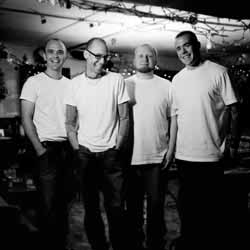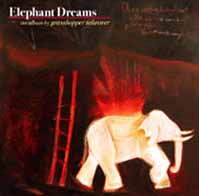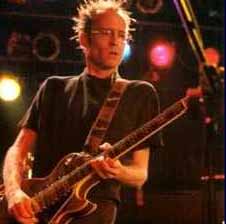|

Grasshopper
Takeover:
There and Back Again
story by tim mcmahan
| |
|
Lazy-i: March 24, 2004
|
Grasshopper Takeover
w/Lucky Boys Confusion, Swizzle Tree, more
March
27
Sokol Auditorium
13th & Martha
5 p.m.
This
is the fourth part in an ongoing series that traces the ups and downs of
Grasshopper Takeover, a power-pop rock band formed in Omaha.
Part
1, published July 9, 1998, documents the band from its origins to
its flight from Omaha to Los Angeles. Part
2, published Dec. 23, 1998, recaps the band's first months in L.A. and
their struggle to play on the Sunset Strip rock scene. Part
3, published July 27, 2000, catches up with the band during a brief break
on their 18-month national tour.
| |
| If this was
an episode of VH-1's Behind the Music, Omaha rock band Grasshopper Takeover's
life story would be somewhere past the third commercial, after the inevitable
downfall and Phoenix-like return from the ashes. Literally. But
we're picking it up after the second commercial, back in July 2000 when our heroes
-- guitarist/vocalist Curt Grubb, drummer Bob Boyce and bassist James McMann (guitarist
Michael Cioffero had yet to join the band) -- were just beginning a nationwide
tour expected to last nine months. The world was their rock 'n' roll oyster with
a home base in sunny Los Angeles where they'd moved two years earlier to be closer
to the rock industry. "We were still living there in '99, but we're
getting ready to go on tour," said Grubb over coffee at Caffeine Dreams.
"You mentioned a 9-month tour. It was more like two years. It lasted from
the end of 1999 until about 2002. After 18 months on the road, we decided to give
up the L.A. apartment and rehearsal space." It wasn't the classic tail-between-the-legs
"retreat" that has scarred so many other bands that followed the yellow
brick road to that famous beckoning Hollywood sign only to be told that they couldn't
get a meeting with the man behind the curtain. Grubb said the move had more to
do with following the target than leaving it behind. "The same philosophy
applied then as now: I go where the music takes me," he said. "The reasons
we didn't go back to L.A. were financial and creative. You get off the road after
18 months and there's not a lot of money in the bank. "We figured if
we go back there it's going to cost $8,000 just to get reestablished, and $2,000
a month to live in our place in Echo Park. Or we come back to Omaha and put together
a studio. If we're artists, we can create anywhere. We don't need the California
sun as a catalyst."
|
| |
The band already had gotten almost everything
they wanted out of L.A. anyway, from meetings with high-level A&R people including
the CFO of Universal Records, to gigs at Sunset Strip clubs and a booking agent.
But the big-time record label deal remained elusive. "We had interest,
but our guiding philosophy has been to stay on our own path, sometimes to our
detriment," Grubb said. "Even the CFO wanted us to stick around L.A.
and do showcases, but we wanted to tour." Their willingness to live
on the road eventually got them the arena-sized gigs that they always dreamed
about -- opening for old friends 311 and the insanely hot Incubus as part of a
Levi's-sponsored tour in early 2001. Once the tour was announced, GTO's
exposure went to a whole 'nother level. "We started getting hundreds of e-mails
a day. It was an explosion that lasted before, during and after we stepped on
stage," Grubb said. Halfway through the 311/Incubus tour, Atlantic
Records offered GTO a "demo" deal that would put their song, the bouncy
pop tune "Esta Vida," on a compilation CD next to songs by some of the
country's hottest acts. But GTO turned it down. "If it didn't work out, we
were still contractually tied to Universal for two years. It would have been like
hitting a bull's-eye in a blackout in a snowstorm with a b-b-gun from 200 yards
away." Atlantic would be the last major to come knocking, which came
as a surprise to GTO and their fans. In retrospect, Grubb says the band's music
isn't easy to categorize, which makes for tough marketing. "The songs we
play that should be on the radio don't fit the format," he said, adding that
even their heavy songs, like the fan favorite "Bone Crusher," aren't
raucous enough to be heard on stations that play Korn and Limp Bizkit in heavy
rotation. Grubb said six years of recording and touring have yet to net
GTO the big payday that they used to think was just around the corner. These days,
the band that dreamed of being as big as U2 has set its sights a bit lower. "It
would be nice to put something in the bank for myself," Grubb said. "We've
never paid ourselves over the years. Every penny has gone to the Grasshopper Takeover
bank account. There were times when we had so much money but still didn't pay
ourselves. Like any small business, you need to treat your income as one step
further into your next venture. If you have $10,000 in the bank, that's enough
to buy more T-shirts and 3,000 CDs." Regardless, making money has never
been the band's No. 1 goal. "As cliché as it sounds, if you're not
doing it for the music, get out now," Grubb said. "It's pretty hard
to find three guys willing to stay together for seven years without seeing a dime.
It let's you know that you have something special. "It would just be
nice to get paid someday, but if I don't, I can't not write songs. Maybe I won't
be famous until after I die, and when I'm gone, I'll leave a legacy of music."
|

|
"It's
pretty hard to find three guys willing to stay together for seven years without
seeing a dime. It let's you know that you have something special."
| |
| |

| |
"If
we're artists, we can create anywhere. We don't need the California sun as a catalyst."
| | |
Music like the band's recently released
album, Elephant Dreams, the product of a new $15,000 home studio that provided
unlimited time and resources for recording the CD's 19 tracks. "We've
always gone into the studio and recorded songs exactly as we played them live.
We had no money for production ditties," Grubb said. "This time we could
spend a month on a song. Instead of nailing the drum part in 30 minutes, we could
spend two weeks on it. It would have cost us over $100,000 in studio time. Having
the freedom to put an album like this together is the best thing to happen to
us on a creative level." But sometimes having no limits isn't necessarily
a good thing. "You have to set an absolute deadline with that kind of freedom,"
Grubb said. "We set the date for the CD release party and started promoting
it so we couldn't go back on it. We still had three songs to record, so we cranked
shit out the final three or four months. In classic fashion, we got the CD the
day before the show." The Nov. 26 concert at Sokol Auditorium sold
out, just like the band's farewell show at Sokol almost six years earlier. In
addition, that evening GTO sold more than 1,000 copies of Elephant Dreams
-- a concept CD that in part recounts the band's all-time low -- when their tour
van was stolen loaded with $25,000 of equipment -- an incident that couldn't have
happened at a worse time. "We were at a point where the crowds were
dipping at our shows, kind of like an old girlfriend that you still love but don't
want to sleep with every night," Grubb said. "It had been two years
since we put out a CD and the fans were wondering if we were still in the game.
The reality was that we had our noses to the grindstone trying to get the next
album out." When their van was stolen literally before their eyes it
was "a total loss and total violation," Grubb said. "People thought
the whole thing was a publicity stunt. I'm thinking, 'Thanks for the compliment.'
If I had the power and expertise to pull a stunt like that, it would be pretty
amazing." The aftermath -- the van being burned up, the return of their
gear, and the donation of a new van by local newsman Dave Webber -- was covered
closely in the local media. So much, in fact, that sound bites from TV and radio
reports were woven between some of the songs on Elephant Dreams. "We
couldn't not do it," Grubb said. "Every band is supposed to have a story.
This documents ours." Clocking in at over 70 minutes, Elephant Dreams
easily is GTO's most ambitious and musically varied recording. The music sounds
like the feel-good stadium rock that you used to hear on the FM in the '70s and
'80s. Big guitars playing big riffs on songs with big hooks sung by Grubb in his
slippery midrange voice that has just enough polish to remind you that he's not
indie and doesn't want to be. There are certain elements that are oddly modern
amidst the usual guitar bombast. But the rhythms and melodies are pure heavy pop
rock -- not pop-punk, not trip-hop -- just plain rock, born from the minds of
four Midwestern guys who grew up loving the bands they heard on the radio. Pure
fun, with no regrets. A self-released CD, GTO recently signed a distribution
deal with Harvest Media Group. Needless to say, a tour will follow. So
will their story have a traditional fame-and-fortune Behind the Music ending?
Only time will tell, though Grubb would just be happy if the story never ended
at all. "I don't want to think small, but it would be nice to sell
10,000 copies of the new CD and create five or 10 markets for us," Grubb
said. "It would be nice to be able to put some money in the bank and be able
to tour for a long time. "It would also be nice to sell 10 million
copies. But we know where we are as a band. The idea of getting picked up by a
major label is fantastic, but it never guides anything we do anymore. As a result,
the music becomes more pure in that it is just a piece of art we hope to survive
on. Beyond that, everything is a bonus."
Back
to  Published
in The Omaha Reader March 24, 2004. Copyright © 2004 Tim McMahan. All rights reserved.
| | |
| | | |
